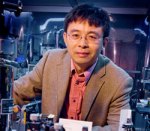Yet another technological development could significantly increase the sunlight conversion efficiency of solar cells.
A University of Texas team lead by chemist Xiaoyang Zhu have discovered it may be viable to double the number of electrons harvested from one photon of sunlight through the use of organic plastic semiconductor material.
While the maximum theoretical efficiency of silicon solar cells commonly used today is approximately 31 percent due to the rate of the sun’s energy hitting a cell being too great and much of it being lost as heat, the ability to capture the “hot electrons” could see efficiencies as high as 66 percent in conjunction with the use of solar concentrators.
Zhu and his team have previously demonstrated capture of the hot electrons might be achieved by using semiconductor nanocrystals – also known as quantum dots; but implementation is challenging. The researchers found an alternative after discovering a photon produces what they refer to as a dark quantum shadow state called a multiexciton.
It’s this multiexciton Zhu says that would be the most efficient source of two electrons and it could be harvested by a material such as fullerene in a pentacene semiconductor. According to Wikipedia, a fullerene is a molecule composed entirely of carbon and pentacene is a polycyclic aromatic hydrocarbon consisting of five linearly-fused benzene rings.
“Plastic semiconductor solar cell production has great advantages, one of which is low cost,” said Zhu, a professor of chemistry. “Combined with the vast capabilities for molecular design and synthesis, our discovery opens the door to an exciting new approach for solar energy conversion, leading to much higher efficiencies.”
Zhu believes the discovery could see the development of solar cell efficiencies of up to 44 percent without the need for concentrators and his previous research has led him to the conclusion that “is no reason that we cannot be using solar energy 100 percent within 50 years.”
Zhu’s research was supported by the National Science Foundation and the Department of Energy.
Source












































